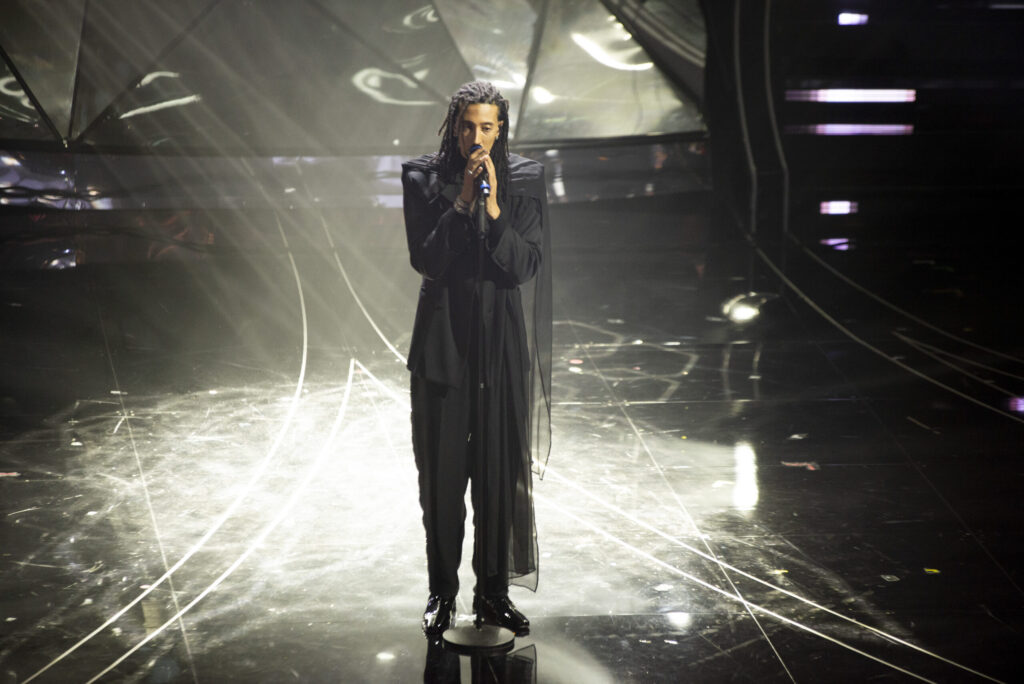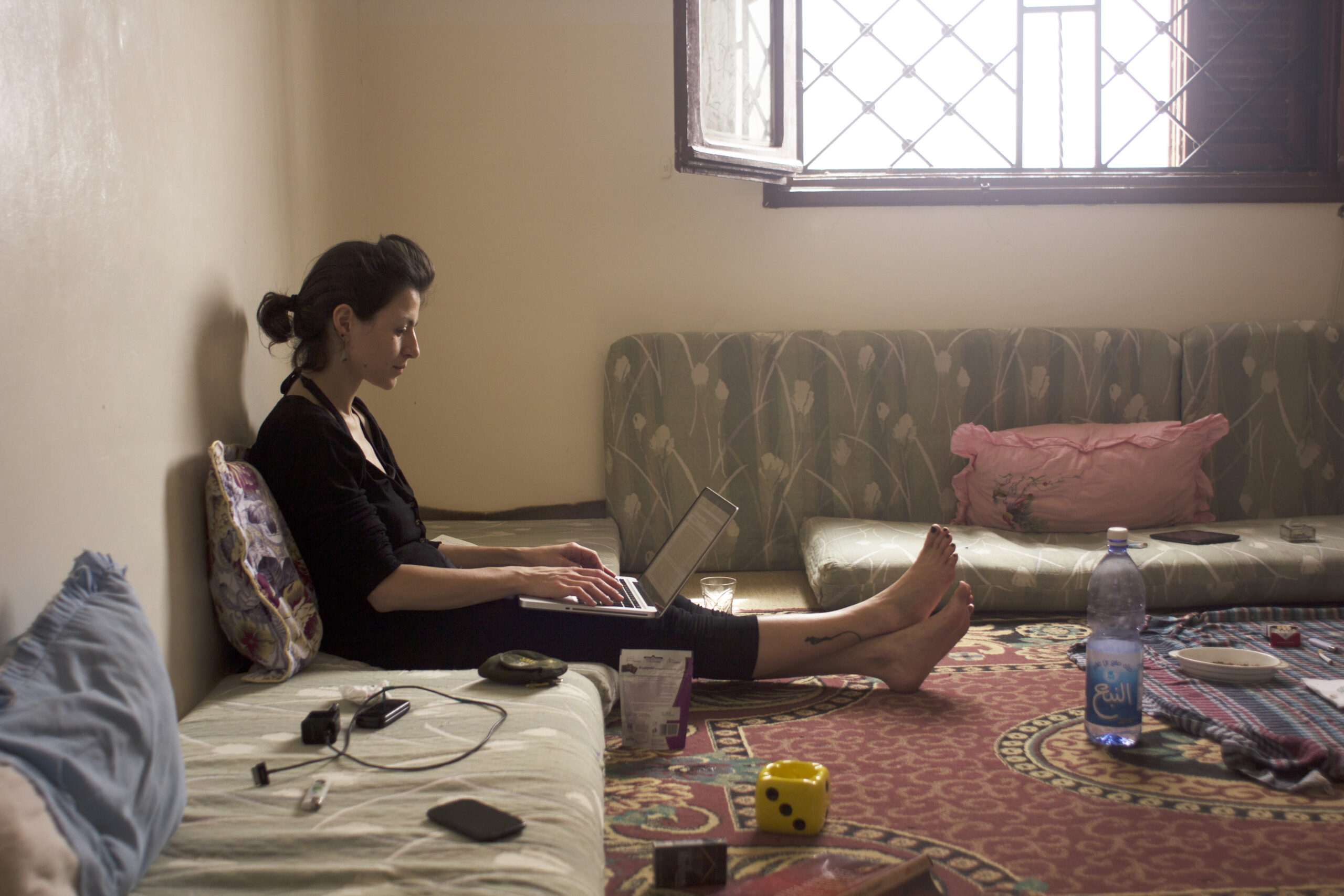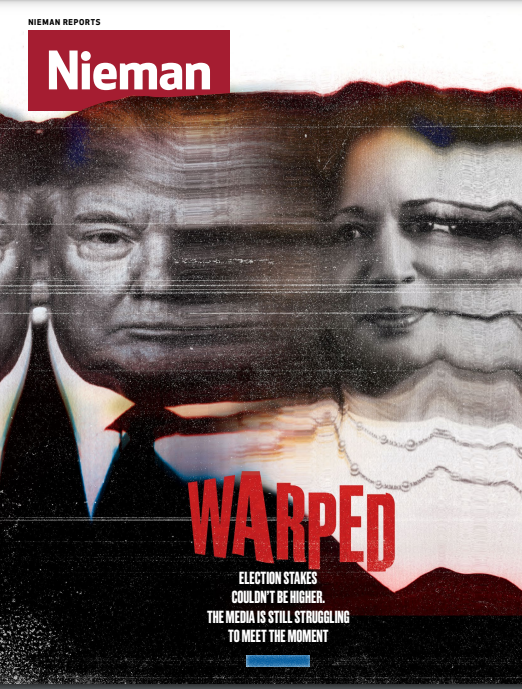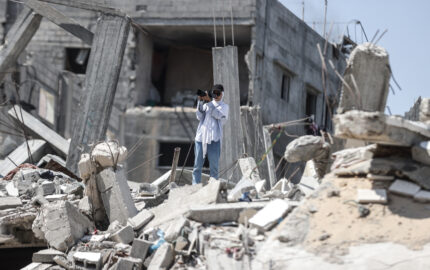"You can tell me what you want, I’m not going to do like RAI.”
Those words — about the Italian public broadcaster Radiotelevisione Italiana — came just a few seconds into rapper Ghali’s most recent hit song “Paprika.” The lyrics take aim at RAI executives for their apologies following his appeal in February to “stop genocide” during the Sanremo Italian Song Festival, one of Italy’s most watched and long-running music events. Ghali’s performance prompted RAI’s chief executive to reaffirm the broadcaster’s support of Israel, which in turn led to a protest outside of RAI headquarters in Naples, and sparked demonstrations nationwide.
Ghali’s critique reverberated across Italy. “Paprika” was released on May 10, just a couple of days after RAI journalists went on a one-day strike to raise awareness about what the trade unions were calling “suffocating control” the right-wing government of Prime Minister Giorgia Meloni has over the broadcaster and the declining state of press freedom in Italy. In April, RAI disinvited Antonio Scurati — an author who chronicled Benito Mussolini’s rise to power — from reading on-air an essay about the rise of fascism that criticizes Meloni for being “stubbornly stuck to the ideological line of her neo-fascist culture of origin.” (Scurati was invited by talk show host Serena Bortone to read the monologue for Italy’s Liberation Day, an annual holiday celebrating the end of the fascist government and Nazi occupation after World War II.) Since taking office nearly two years ago, Meloni and her party, the Italian Brotherhood, have exerted what critics say is extreme pressure on the broadcaster, forcing out legacy executives and hosts and replacing them with political allies. The situation escalated so much that this past May, representatives from the Media Freedom Rapid Response, an organization dedicated to press freedom within the European Union, organized what they called an urgent mission to Rome to document and discuss potential solutions to Italy’s wave of censorship.

The upheaval at RAI — which has earned the nickname “Tele-Meloni” — is one symptom of a larger issue plaguing Italian media. This year, Italy’s press freedom ranking from Reporters Without Borders dropped five spots from 41 to 46 because of threats from organized crime and violent extremist groups, a gag law that makes it more difficult for journalists to cover court cases, and a legal system that helps propagate strategic lawsuits against public participation (SLAPPs). “There is a common illness — the insufficient protection of journalists covering news that is uncomfortable for those in power, who then challenge the right to a free press with physical and verbal violence,” said Alberto Spampinato, director of Ossigeno per l’Informazione (Oxygen for Information), an organization monitoring press freedom in Italy. Italy, he noted, is among the countries in Europe that allow for the criminal prosecution of defamation, a charge punishable with fines that in some cases can reach 50,000 euros and up to three years in prison.
“It doesn’t come at a surprise, however, that we’ve reached this concerning point of no return,” says Sara Manisera, a 34-year old Italian freelance journalist covering migration, environmental issues, and organized crime in Italy. (She is also a co-founder of FADA Collective, a nonprofit that brings together independent freelance journalists.) “We’ve been seeing clear, alarming signals for a while.”
In January 2023, Manisera received a notification from police that she was charged with defamation because of comments she made during a June 2022 journalism award ceremony. Her speech mentioned her work documenting how organized crime infiltrated the municipal government of Abbiategrasso, a town in northern Italy, through construction contracts designed to funnel public money to criminal groups.
Though she was not facing a prison sentence, the ordeal obstructed her work. “Collecting documents to prove my innocence took away precious time from my reporting, and worsened my mental health,” she said. “It also discouraged me to openly speak at public events I’m invited to in northern Italy.”

Manisera’s case is one of hundreds of attacks on the Italian press in recent years that include newsroom police raids and the wiretapping of journalists reporting on sensitive topics like environmental corruption and the refugee crisis. In 2022 alone, 161 lawsuits were initiated against journalists in Europe, and Italy leads the way with 27, according to the Coalition Against SLAPPs in Europe.
In one of the most high-profile cases of press intimidation, Roberto Saviano, a journalist and author, was found guilty last October of libeling the prime minister. He was ordered to pay 1,000 euros for calling Meloni a “bastard” over her response to ships rescuing migrants in the Mediterranean Sea. It’s a case that has had a chilling effect, media advocates say — especially in light of the push by members of her political party, the Brothers of Italy, to increase the penalties for defamation that would see journalists punished by up to four and a half years in prison and subjected to fines of up to 120,000 euros.
Seven months earlier, in March 2023, the office of Domani, one of the few independent Italian newspapers that doesn’t rely on funding from political entities, was raided by the Carabinieri, a national police force in Italy. The Rome-based outlet was targeted after the former Italian labor minister filed a criminal defamation complaint because of an article by Giovanni Tizian and Nello Trocchia that implied he was involved with organized crime. Tizian and Trocchia, in a separate case, are also facing nine years in prison after being charged with receiving confidential documents from a public official and breaching the secrecy of an investigation by publishing information in those documents. The charges against Tizian, Trocchia, and a third reporter, Stefano Vergine, stem from reporting on the consulting fees arms manufacturers had paid Guido Crosetto before he became defense minister, highlighting his potential conflicts of interest.
In May 2024, Pasquale Napolitano, a journalist from Il Giornale, was fined 6,500 euros and sentenced to eight months in prison for an article published in 2020 that allegedly criticized the work of a group of Italian lawyers. (Napolitano is not expected to serve time in prison because it was his first offense.)
Much of the intimidation is related to reporting on the refugee crisis. Since 2014, a number of right-wing governments have been elected across Europe and subsequently taken a hardline stance against immigration. In that time, at least a dozen Italian journalists have been wiretapped by Italian authorities because of their work — especially after publishing stories that could be construed as embarrassing for the government.
Lorenzo Tondo, The Guardian’s migration correspondent based in Palermo, was wiretapped by Italian intelligence services between 2016 and 2017. The wiretapping began after he published a story in 2016 about how Italian authorities mistook an Eritrean refugee for an infamous human trafficker, which called into question the government’s ability to handle the migration crisis and investigate abuses. Court documents showed that prosecutors in Sicily secretly recorded some of Tondo’s conversations with one of his sources. Tondo was never notified of the wiretapping, and only found out about it while reviewing court documents. (Court officials declined to comment.)
In March 2021, Nancy Porsia was working on an investigation about the conditions of migrants in Libya when she received a phone call from a concerned colleague who told her that her name along with transcripts of entire conversations appeared in a pile of court documents in Trapani, a city in western Sicily.
Porsia’s phone was put under government surveillance in the hopes of finding in her conversations any potential connection between humanitarian organizations and human traffickers. Prosecutors tapped her for six months in 2017, despite no formal request from police. (Government officials declined to comment on her case.) “It was shocking to learn from someone else that I had been wiretapped,” said Porsia, a freelancer specializing in migration and conflict coverage, with a focus on the Arab region and Africa. “Even my own private conversations with my mother were transcribed and made public.”
Nello Scavo, a correspondent of Avvenire, a daily newspaper affiliated with the Catholic Church, also was caught up in an investigation. Prosecutors from Trapani intercepted his communication with a source about how to receive a video documenting violence inflicted on Libyan migrants. Scavo and his colleagues lost sources once the transcripts went public during the early stages of the Covid-19 pandemic. (Trapani’s prosecutors also declined to comment on Scavo’s case.) He spoke in October 2023 at the European Parliament in Strasbourg to raise awareness on this concerning trend. “I don’t think journalists should be above the law,” he told policymakers. “But I think that transcriptions should be destroyed once verified that they’re irrelevant.” In an interview in April, Scavo reflected on the ordeal. “We were suspected of having contacts with traffickers and holding important information,” he told Nieman Reports. “They were trying to catch us collaborating with rescue ships … bringing more migrants to Italy and incriminating NGOs to prove the government’s thesis that saving lives at sea has become a ‘pull factor.’”
Though wiretapping has created some obstacles for journalists in Italy, defamation suits, often brought by the Meloni government, remain a greater threat to press freedom, Spampinato said. Most of these trials “after years of ordeal and legal expenses, also due to the slowness of our judicial system, end in dismissal,” Spampinato added. “These are just means aimed at bothering journalists, silencing them and disrupting their work.”
Many of the SLAPPs involve defamation claims, which in Italy can be both criminal and civil cases. Those found guilty in a criminal proceeding either must pay expensive fines or serve jail time. (An estimated 70 percent don’t make it to trial, according to numbers compiled by Ossigeno per l'Informazione.) “Although imprisonment only happens on really rare occasions and can be negotiated [during] trial, these legal and monetary punishments definitely discourage journalists from doing their work more seriously,” says Vittorio Di Trapani, president of the Italian Federation of the Press, a journalists’ trade union. “And it impacts the whole media landscape in Italy because the more journalists are scared … the fewer impactful investigations to keep readers informed through transparent reporting are produced. It’s a huge impact on democracy.”
In February, European Parliament members overwhelmingly adopted new rules designed to protect journalists and others working in the public interest from SLAPPs. The regulations, which apply in cross-border disputes, provide two main protections. First, they require “early dismissal if the case is unfounded” and require the person or entity filing the lawsuit “to prove that there are grounds for proceedings to continue,” according to a statement from the parliament. Second, they allow victims of SLAPPs to recoup some of their legal costs or even be paid for damages.
Within Italy, however, there has been little progress. EU countries have two years to adopt the new rules, but the legislature in Italy seems poised to make life harder for journalists — not easier. A bill pending in the Senate would allow the courts to suspend journalists from working if they’re convicted of criminal defamation. And there are few resources within the country that can provide free legal assistance to journalists who are targeted. “While the EU reinforces the protection of journalists’ sources, Italy keeps criminalizing reporters’ work,” said Di Trapani.
But Spampinato and others are hopeful that at least wiretapping cases will decrease. This past January, the Senate's justice committee approved a reform bill that would prohibit the government from releasing to the public transcripts of calls involving third parties not under criminal investigation.
Still, Manisera, who is battling to have her defamation case dismissed, says she wishes there was more support for journalists because intimidation and harassment have become too common. “Since the government doesn't help us, we have to find ways to protect ourselves, especially the ones who don’t have enough visibility and cannot access free legal help,” she said, noting that trade unions should set up a fund “to protect each other when a storm hits one of us. Although I wish we didn’t have to get to this, and [we] never have to use it.”




